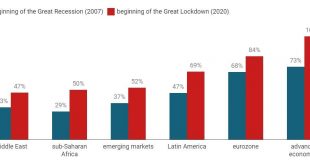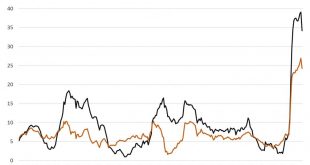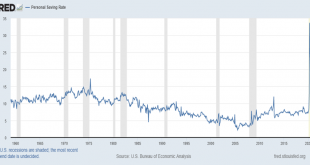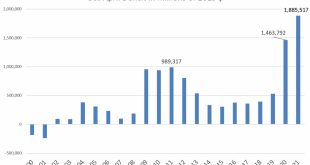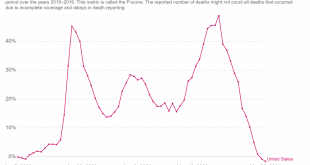In Las Vegas, asset price inflation is combining with rising prices on building materials to create a real estate bubble of remarkable proportions. Original Article: “The Real Estate Boom in Vegas Is More Frenzied Than Ever” Summerlin, the suburb of west Las Vegas creeping ever closer to the mountains, looks to be crowded with fully paved streets, streetlights, block walls, and blue top lots. With lumber, labor, and other materials in short supply, home...
Read More »Public Debt Got a Lot Worse from The Great Recession to The Great Lockdown
The 2020 recession, which many countries are still going through, now has an “official” name: the Great Lockdown. In economic terms, the public sector’s response in practically all countries has been very swift and bold (which is not necessarily a good thing).1 This has caused the global public debt to skyrocket as never before. As a result, now more than ever, it is necessary to emphasize the dangers of public debt. In this article, we will highlight the contrasts...
Read More »How Monetary Expansion Creates Income and Wealth Inequality
“Every change in the money relation alters … the conditions of the individual members of society. Some become richer, some poorer.” – Mises, Human Action, p. 414. New money enters the economy at a particular point. It does not enter in the form of a proportional and simultaneous increase in everybody’s incomes. This means that there are uneven effects of monetary expansion, including exacerbated income and wealth inequality. When we trace the consequences of...
Read More »Money-Supply Growth Finally Slows in March, Drops to 10-Month Low
After three months in a row of hitting new all-time highs, money supply growth slowed in March, dropping to a 10-month low. This slowdown, however, does not suggest any significant departure from the past year’s high growth in money supply—which came in the wake of unprecedented quantitative easing, central bank asset purchases, and various stimulus packages. During March 2021, year-over-year (YOY) growth in the money supply was at 34.1 percent. That’s...
Read More »Yes, Paul Krugman, Booms Are Unsustainable
That Austrians and Keynesians do not share many views on economics (or probably anything else) is obvious, so a difference of opinion between the two hardly should surprise anyone. However, it still is important to point out the differences between the two camps, especially at the current time when Keynesians are all the rage in Washington (When did they ever leave?) and especially in the Joe Biden administration and, of course, the editorial pages of the New York...
Read More »Vaccine Passports and Medical Paternalism
Vaccine passports have been implemented, or are being developed, in a number of countries around the world. In February 2021, Israel introduced its “Green Pass,” which becomes “effective the week after receiving the second dose” of the vaccine and expires after six months. It was followed by China, which launched its digital “International Travel Health Certificate” in March. Subsequently, in April, Denmark implemented its “Coronapas” and Estonia introduced its...
Read More »The US Government Is On Track to Top Last Year’s Record-Breaking Deficits
The Treasury department has issued its spending and revenue report for April 2021, and it’s clear the US government is headed toward another record-breaking year for deficits. According to the report, the US federal government collected $439.2 billion in revenue during April 2021, which was a sizable improvement over April 2020 and over March 2021. Indeed, April 2021’s revenue total was the largest since July of last year when the federal government collected 563.5...
Read More »Excess Mortality in The US Has Plummeted to Pre-Covid Levels
In any given year during the past decade in the United States, more than 2.5 million Americans have died—from all causes. The number has grown in recent years, climbing from 2.59 million in 2013 to 2.85 million in 2019. This has been due partially to the US’s aging population, and also due to rising obesity levels and drug overdoses. In fact, since 2010, growth rates in total deaths has exceeded population growth in every year. In 2020, preliminary numbers suggest a...
Read More »The Corrupt Bargain and the Preservation of Slavery
[Chapter 19 of Rothbard’s newly edited and released Conceived in Liberty, vol. 5, The New Republic: 1784–1791.] The most important battle of the August days of the Constitutional Convention was waged, as had been the battle over the three-fifths clause, between the North and South and had at its heart the institution of slavery. One of the small number of restrictions on Congress in the draft Constitution was a prohibition of any tax on exports, or of any tax or...
Read More »How Markets Have Delivered More Economic Equality
People must still compete for resources in a socialist economy. In fact, the competition is intense. On the other hand, thanks to markets, basic necessities—and even basic luxuries—are now more more accessible than ever. Original Article: "How Markets Have Delivered More Economic Equality" This Audio Mises Wire is generously sponsored by Christopher Condon. Narrated by Michael Stack. [embedded content]...
Read More » Swiss Economicblogs.org
Swiss Economicblogs.org


